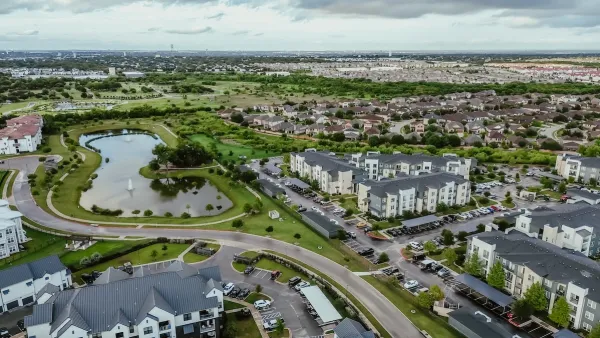Aaron M. Renn has written a scathing review of the state of affairs in Rhode Island, which he describes as a result of decades of unfettered "blue state" policies.
Aaron M. Renn's latest for the City Journal is a wide-ranging editorial, but Renn cites a number of examples from the planning and development realm too build his case regarding the mismanagement of Rhode Island. For example:
- Building has gotten harder. According to Bob Baldwin, a home builder: "They’ve changed the zoning to increase minimum lot sizes, even in areas where nothing is currently built to that size…Plus, there are regulations that go well beyond the state minimums and vary from town to town."
- "The biggest problem for developers is that the approval process can drag out through endless cycles of reviews and objections," explains Renn. Baldwin is again cited, saying that local builders are budgeting for lawsuits during the approval process, and after approvals require several years, developers often wait again for building permits.
- All that process regulatory difficulty has contributed to the cost of living, says Renn: "the so-called median multiple—what a median-income family would have to spend to buy a median-priced home—is 4.4 times income. Accounting for high costs, one survey ranked the average wage, adjusted for cost of living in metro Providence (which includes the entire state), 48th out of 49 large regions for which data were available. (Other surveys show the state doing somewhat better.)"
- The state is also facing increased costs for long-overdue repairs to critical infrastructure, according to Renn. "Rhode Island ranks fourth-worst in the nation in the percentage of its bridges considered structurally deficient. One major crossing, the Sakonnet River Bridge, recently had to be replaced at a cost of $163 million because of deterioration resulting from a lack of routine maintenance. The condition of roads and highways isn’t much better…Rhode Island ranks 49th among states in per-capita highway spending."
FULL STORY: The Bluest State

National Parks Layoffs Will Cause Communities to Lose Billions
Thousands of essential park workers were laid off this week, just before the busy spring break season.

Retro-silient?: America’s First “Eco-burb,” The Woodlands Turns 50
A master-planned community north of Houston offers lessons on green infrastructure and resilient design, but falls short of its founder’s lofty affordability and walkability goals.

Delivering for America Plan Will Downgrade Mail Service in at Least 49.5 Percent of Zip Codes
Republican and Democrat lawmakers criticize the plan for its disproportionate negative impact on rural communities.

Test News Post 1
This is a summary

Test News Headline 46
Test for the image on the front page.

Balancing Bombs and Butterflies: How the National Guard Protects a Rare Species
The National Guard at Fort Indiantown Gap uses GIS technology and land management strategies to balance military training with conservation efforts, ensuring the survival of the rare eastern regal fritillary butterfly.
Urban Design for Planners 1: Software Tools
This six-course series explores essential urban design concepts using open source software and equips planners with the tools they need to participate fully in the urban design process.
Planning for Universal Design
Learn the tools for implementing Universal Design in planning regulations.
EMC Planning Group, Inc.
Planetizen
Planetizen
Mpact (formerly Rail~Volution)
Great Falls Development Authority, Inc.
HUDs Office of Policy Development and Research
NYU Wagner Graduate School of Public Service





























